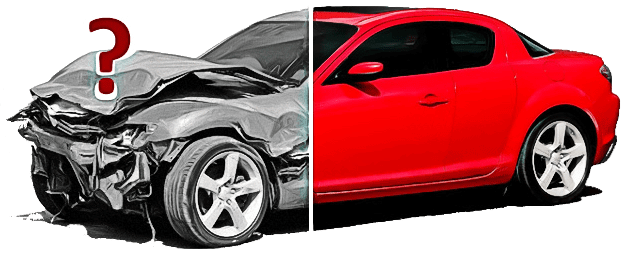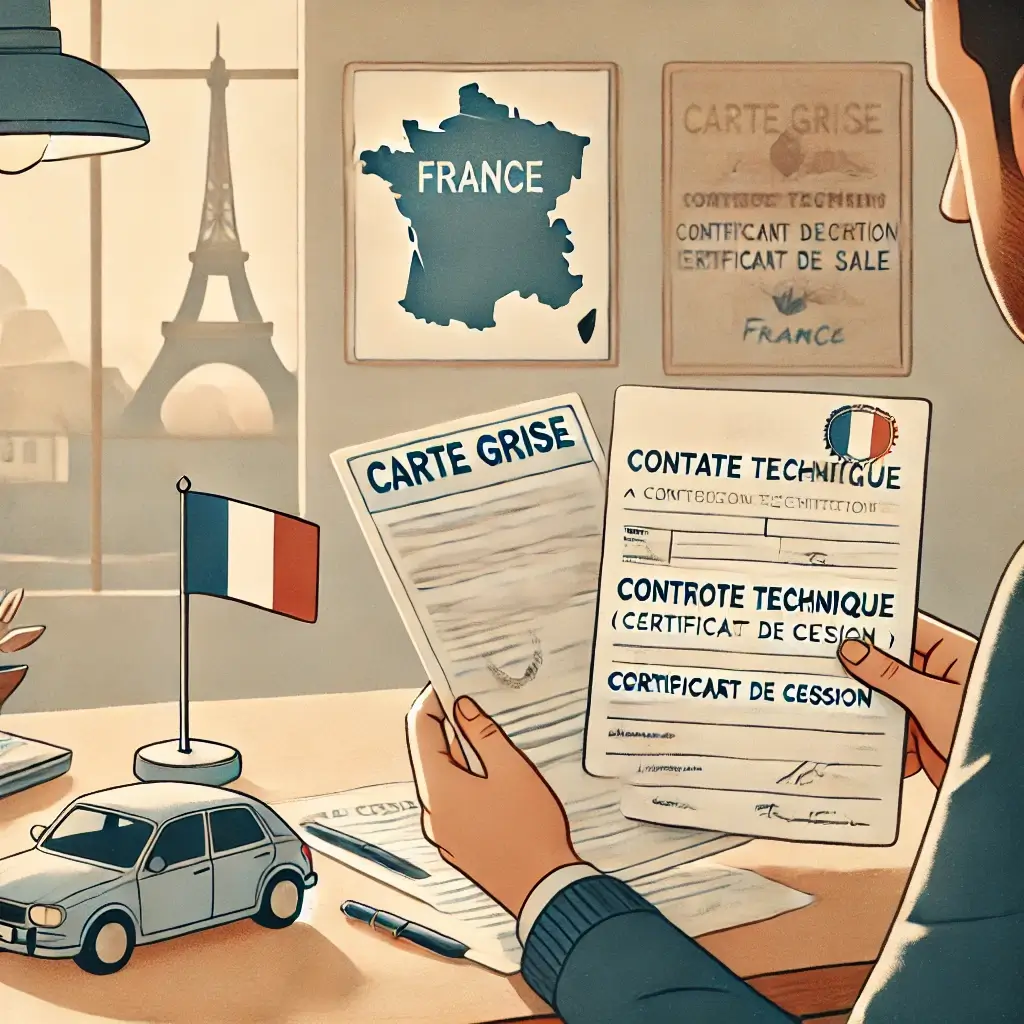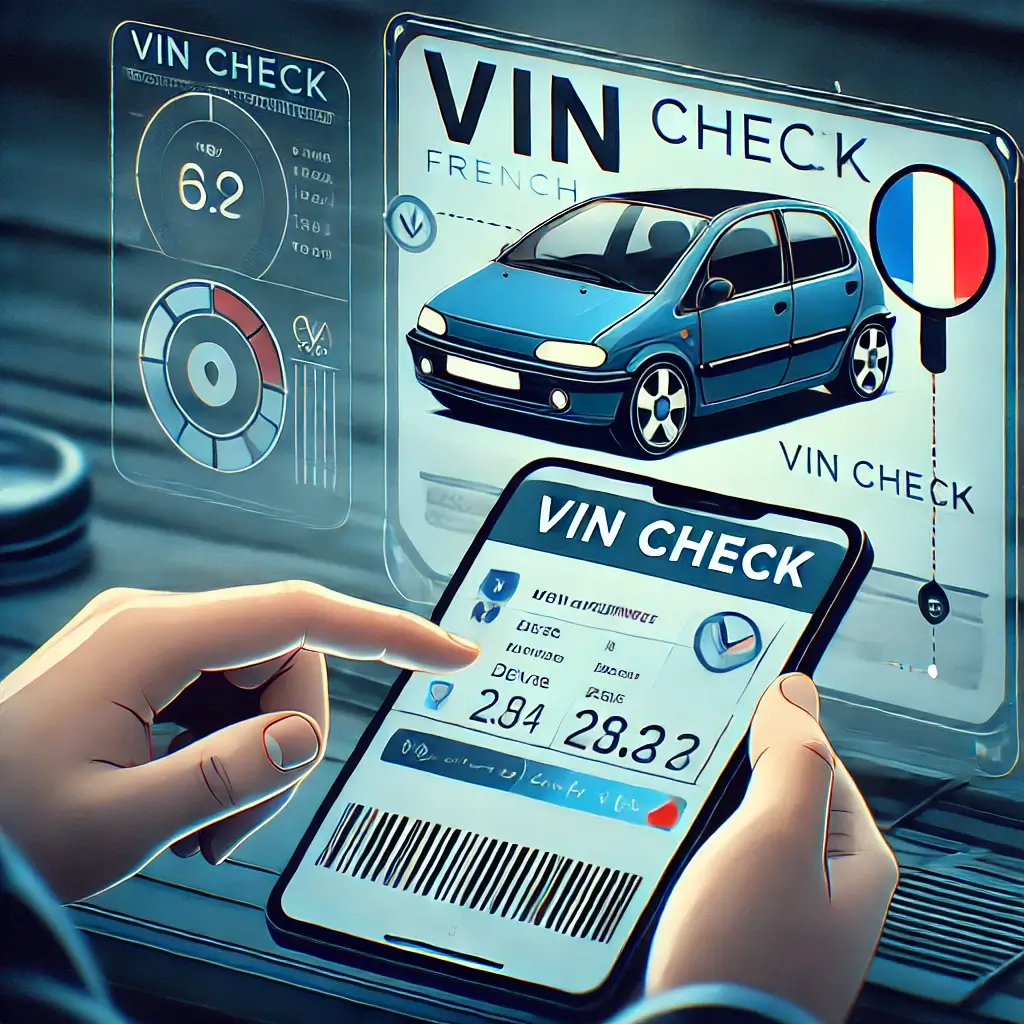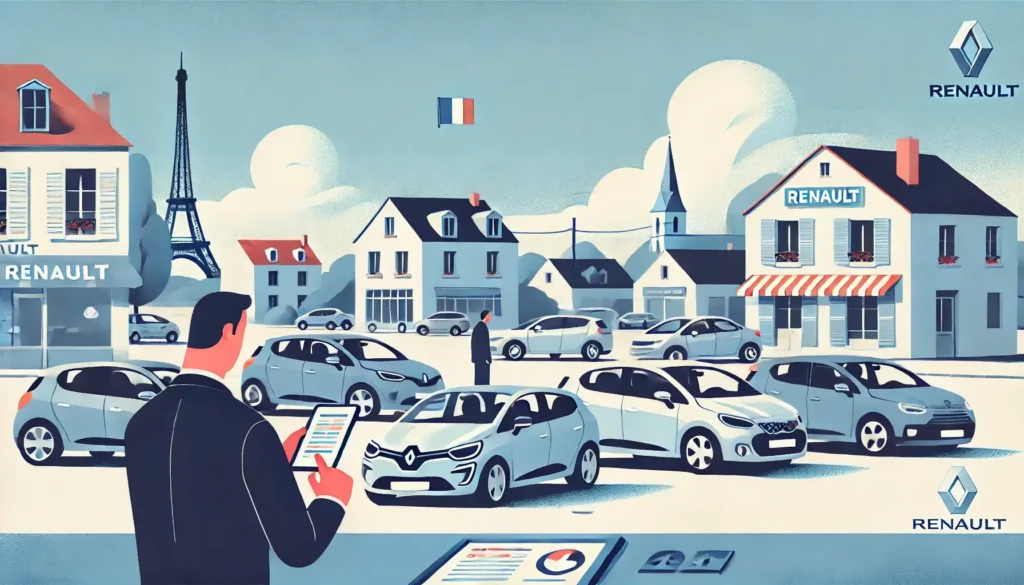
VIN Check FRANCE 🇫🇷
VIN check France reveals information about any used car. If you’re considering buying one, use it first to know its vehicle specs, accidents, odometer history, market value and equipment details.
Example VIN: WBA11AW090FN15037 or Number Plate: AB563QH
(1462+ check reviews)
Check the vehicle history before buying:
In general, the French take their machinery a little differently than the car owners of neighbouring countries. For them, a used car is just as valuable as a pussy-new one. When you move around the country, you often see old, dusty, hard-hitting machines on the roads that run from every end. We recommend using VIN Check Europe for every car you consider to purchase.
This consumer attitude towards cars is also reflected in the aftermarket of cars, where many of the machines on sale have already passed for several hundred thousand kilometres.
French car owners often take great pride in maintaining their vehicles, which means you’re likely to find cars in excellent condition. The service history is usually well-documented, and many used cars come with detailed records of maintenance and repairs. This transparency adds another layer of security to your purchase, ensuring you get a vehicle that’s been well cared for.
Purchasing a used car from France offers a combination of cost savings, diverse vehicle options, and ease of importation that’s hard to beat. Whether you’re after a budget-friendly compact, a luxurious ride, or an eco-friendly electric vehicle, the French market has something to offer.


France VIN check available for cars models. Also for German vehicles.
A Complete Guide to Buying a Car in France
Buying car from France?
If you’re planning on moving to France then the first thing that comes to your mind is to go around France which has amazing places to see. Most of the Metropolitan cities in France have good transportation systems for the public while small cities will require a person to have a car. Purchasing a car requires some time and energy a background study. At the end of the day, you are investing your hard-earned money to buy a car which is quite expensive. This article will throw light on things that you need to consider while buying a car in France (using VIN Check France). The article will take you through the entire process. Keep scrolling to get a clear understanding.
Why Buying a Used Car from France Can Be a Good Deal
When considering the purchase of a used car, many buyers automatically think of local markets or popular destinations such as Germany or Italy. However, France has emerged as a highly attractive option for used car shoppers, offering several compelling advantages. Below, we explore why buying a used car from France can be a smart financial move and why it might be the right choice for your next vehicle.
1. Cost Savings: Affordable Used Cars in France
One of the most significant benefits of purchasing a used car in France is the potential for cost savings. Due to various economic factors, used cars in France often have lower price tags compared to other European countries. Here’s why:
- Depreciation Rates: Cars in France tend to depreciate faster than in neighboring countries. This means that a vehicle that’s only a few years old can be purchased at a significantly reduced price, offering great value for money. French drivers typically change cars more frequently, contributing to a robust and varied second-hand market with competitive pricing.
- Market Saturation: France has a large automotive market, with millions of vehicles sold annually. The sheer volume of cars available drives down prices, particularly for models that are a few years old. When supply outstrips demand, buyers can find excellent deals on high-quality vehicles.
- Lower Taxes and Fees: Depending on where you’re importing the vehicle, France’s taxation and registration fees might be more favorable compared to other countries. This can further reduce the overall cost of acquiring a vehicle from France, especially if you’re buying a model that’s more expensive in your home country.
For more detailed information on the pricing and depreciation of cars in France, you might want to check out this guide on car depreciation rates.

2. Diverse Vehicle Options: A Wide Range of Choices
France is home to some of the world’s most iconic car brands, and the domestic market reflects this diversity. When buying a used car from France, you can access a wide range of vehicles, from budget-friendly compact cars to luxury SUVs. Here are some key points to consider:
- Popular French Brands: French automakers like Peugeot, Renault, and Citroën offer a variety of models that cater to different needs and preferences. Whether you’re looking for a reliable city car, a stylish sedan, or a family-friendly SUV, French brands provide plenty of options. For instance, the Renault Clio and Peugeot 208 are among the best-selling models, known for their efficiency, comfort, and affordability.
- Luxury and Specialty Vehicles: France’s used car market isn’t limited to domestic brands. You’ll also find a wide array of luxury vehicles and specialty cars, including German, Italian, and British brands. This is particularly beneficial for buyers looking for a premium vehicle at a reduced cost. For example, you might come across well-maintained BMWs, Mercedes-Benz, or even Porsche models that have depreciated in value but still offer top-notch performance and luxury.
- Electric and Hybrid Models: France has been at the forefront of the electric vehicle (EV) revolution, and the country’s used car market reflects this trend. If you’re interested in purchasing an EV or hybrid, France offers a good selection of models like the Renault Zoe or the Peugeot e-208. These vehicles are often priced more competitively than in other European markets, making them an attractive option for environmentally-conscious buyers.
For more insight into the diversity of vehicles available in France, take a look at this comprehensive overview of the French automotive market.
Understanding the French Used Car Market
The French used car market is one of the largest in Europe, offering a diverse range of vehicles, from budget-friendly compacts to luxury sedans. Whether you’re a local resident or an international buyer, understanding the intricacies of this market can help you make informed decisions and avoid potential pitfalls. In this blog post, we’ll provide a detailed overview of the French used car market, explore the legal framework involved in purchasing a vehicle, and recommend some of the best places to buy a second-hand car in France.
Market Overview: Trends and Common Pitfalls
The French used car market is thriving, with millions of transactions taking place each year. In recent years, the market has seen some notable trends that are shaping the way people buy and sell vehicles.
1. Increasing Demand for Eco-Friendly Vehicles
As environmental concerns continue to grow, there has been a significant shift towards electric and hybrid vehicles in the French market. Models like the Renault Zoe and Peugeot e-208 are becoming increasingly popular, both as new and used options. The government’s incentives for low-emission vehicles have contributed to this trend, making eco-friendly cars more accessible and affordable.
2. High Depreciation Rates
One of the standout features of the French used car market is the relatively high depreciation rate of vehicles. French cars tend to lose value quickly, especially in the first few years, which can be both a benefit and a drawback. For buyers, this means you can often find a relatively new car at a significantly reduced price. However, sellers need to be aware that their vehicle may not retain its value as well as in other markets.
3. Preference for Smaller Vehicles
French consumers generally prefer smaller, fuel-efficient cars, especially in urban areas where parking and narrow streets are common challenges. This trend is reflected in the used car market, where models like the Renault Clio, Peugeot 208, and Citroën C3 are consistently among the top sellers. If you’re in the market for a compact car, you’ll find plenty of options available.
Common Pitfalls to Avoid
While the French used car market offers great opportunities, there are also some pitfalls to be aware of:
Overlooked Documentation: Ensure that all necessary documents, including the vehicle’s service history, are complete and accurate. Missing documentation can lead to unexpected issues down the line.
Hidden Costs: Be mindful of additional costs such as registration fees, taxes, and potential repairs that might not be immediately apparent during the purchase.
Undervalued Trade-Ins: If you’re trading in a vehicle, be aware that depreciation rates might mean you get less for your trade-in than expected. It’s worth getting multiple quotes before making a decision.
For a more in-depth look at the current trends and challenges in the French used car market, you can explore this report on the automotive market in France.

Legal Framework: What You Need to Know
When buying a used car in France, it’s crucial to understand the legal requirements to ensure a smooth and legitimate transaction. Here are the key elements you need to consider:
1. Certificat de Cession (Certificate of Sale)
The certificat de cession is a mandatory document that must be completed and signed by both the buyer and the seller when a vehicle is sold. This document officially transfers ownership of the vehicle from the seller to the buyer. It contains important information such as:
- The names and addresses of both parties
- The vehicle’s make, model, and registration number
- The date and time of the sale
- The agreed-upon sale price
Both parties must keep a copy of this document, and the buyer needs to submit it to the local prefecture to register the vehicle in their name. You can find more information on how to complete this process on the official French government website.
2. Contrôle Technique (Technical Inspection)
In France, vehicles over four years old must undergo a contrôle technique every two years. This technical inspection checks the roadworthiness of the vehicle, ensuring it meets safety and environmental standards. If you’re buying a used car that is over four years old, the seller must provide a valid contrôle technique certificate that is less than six months old. Without this, the sale cannot legally proceed.
3. Carte Grise (Registration Certificate)
The carte grise, or registration certificate, is the document that proves the vehicle is registered in the buyer’s name. After purchasing a used car, the buyer has one month to apply for a new carte grise. This process can be done online through the Agence Nationale des Titres Sécurisés (ANTS) website. The cost of registering the vehicle varies depending on factors such as the car’s age, engine size, and region.
4. Vehicle History Report
Before finalizing the purchase, it’s wise to request a vehicle history report to check for any potential red flags. This report provides information on the car’s accident history, odometer readings, and whether it has been reported stolen. It’s a critical step in ensuring that you’re buying a vehicle that’s free of legal issues.
For a complete guide on the legalities of purchasing a used car in France, refer to this legal checklist.
Where to Buy: Reputable Platforms and Dealerships
Finding a reliable source for purchasing a used car in France is key to a successful transaction. Here are some of the best places to start your search:
1. LeBonCoin
LeBonCoin is one of the most popular online marketplaces in France, offering a wide range of used vehicles. The platform is user-friendly and allows you to filter searches by location, price, model, and more. However, buyers should exercise caution and ensure they verify the legitimacy of the seller before making a purchase.
2. AramisAuto
AramisAuto is a reputable online dealership that specializes in the sale of used cars in France. They offer a wide selection of vehicles that have undergone thorough inspections and come with warranties. This platform is particularly appealing for those who want a hassle-free buying experience, as it handles all paperwork and provides financing options.
3. Renault Occasions
For those specifically interested in Renault vehicles, Renault Occasions is the brand’s official platform for used cars. Here, you can find certified pre-owned Renault models that come with warranties and have passed rigorous inspections. It’s a great option if you’re looking for a reliable vehicle from a trusted brand.
4. AutoScout24
AutoScout24 is a popular platform that lists used cars from various dealerships across France. It offers a vast selection of vehicles, including those from international brands. The platform provides tools to compare prices and features, making it easier to find a good deal.
Navigating the French Used Car Market
The French used car market offers a wealth of opportunities, but it also requires careful consideration and due diligence. By understanding market trends, adhering to legal requirements, and choosing reputable platforms and dealerships, you can make a purchase that’s both cost-effective and satisfying.
Whether you’re a local buyer or someone looking to import a vehicle from France, this guide should help you navigate the process with confidence. For more tips and insights on buying a used car in France, be sure to check out our recommended resources and consult experts when needed. Happy car hunting!
How to Perform a VIN Check on a French Vehicle
When buying a used car, especially from a foreign market like France, it’s crucial to gather as much information as possible about the vehicle’s history. One of the most effective ways to do this is by performing a VIN check. The Vehicle Identification Number (VIN) is a unique code assigned to every vehicle, serving as its fingerprint. By conducting a VIN check, you can uncover valuable details about the car’s past, ensuring that you make a safe and informed purchase. In this blog post, we’ll guide you through the process of performing a VIN check on a French vehicle.

Where to Find the VIN on a French Vehicle
Before you can perform a VIN check, you need to locate the VIN on the vehicle. The VIN is a 17-character alphanumeric code that is stamped on various parts of the car and included in several documents.
**1. Common Locations on the Vehicle
Dashboard: The most common place to find the VIN is on the lower left-hand corner of the dashboard, near the windshield. Standing outside the vehicle, look through the windshield at the dashboard on the driver’s side. The VIN should be clearly visible.
Driver’s Side Door Jamb: Another common location for the VIN is inside the driver’s side door jamb. Open the door and look at the area where the door latches to the body of the car. The VIN is usually located on a sticker or metal plate.
Engine Block: In some vehicles, the VIN can also be found stamped onto the engine block itself. This location is less convenient but provides a secondary method to verify the VIN.
Under the Hood: The VIN might also be located on a metal plate under the hood, often near the front of the engine bay.
**2. Vehicle Documentation
Carte Grise (Registration Certificate): The VIN is listed on the vehicle’s carte grise, or registration certificate. This document is crucial when buying a used car in France, as it includes all the official information about the vehicle.
Contrôle Technique (Technical Inspection Report): If the vehicle has undergone a contrôle technique, the VIN will also appear on this document. This is especially relevant for cars over four years old.
For a more detailed guide on finding the VIN on different types of vehicles, you can refer to this VIN location guide.
Steps to Perform a VIN Check on a French Vehicle
Once you’ve located the VIN, the next step is to perform a VIN check to uncover the vehicle’s history. Here’s a step-by-step guide on how to do it:
1. Choose a Reliable VIN Check Service
To perform a VIN check, you’ll need to use a reputable service that specializes in French vehicles. Many online platforms offer VIN checks, but it’s important to choose one that provides comprehensive reports for vehicles registered in France. Some popular options include HistoVec (the official government service), CarVertical, and AutoCheck.
2. Enter the VIN
Once you’ve selected a service, navigate to their VIN check page. You’ll be prompted to enter the 17-character VIN in a designated field. Double-check the VIN to ensure there are no typos, as even a single incorrect character can affect the results.
3. Review and Confirm the Payment
Most VIN check services charge a fee for providing a detailed vehicle history report. After entering the VIN, you’ll be asked to review the cost of the service. If everything looks good, proceed to payment. Some platforms may offer different report levels, so choose the one that meets your needs.
4. Receive the Report
Once the payment is processed, the VIN check service will generate a report. This typically takes just a few minutes, and the report is either displayed directly on the website or sent to your email. Make sure to save a copy of the report for future reference.
5. Analyze the Information
After receiving the report, carefully review all the details provided. This information is crucial in making an informed decision about the vehicle. If any red flags appear, such as a history of accidents or unresolved recalls, you may want to reconsider the purchase.
For more information on using VIN check services, you might find this guide to performing a VIN check helpful.
What Information Will You Get from a VIN Check?
A VIN check provides a wealth of information that can help you assess the condition and history of a vehicle. Here’s what you can typically expect from a comprehensive VIN check on a French vehicle:
1. Registration Details
The VIN check will provide detailed information about the vehicle’s registration history. This includes:
First Registration Date: The date when the vehicle was first registered in France.
Previous Registrations: A record of any changes in registration, such as changes in ownership or registration in different regions.
Current Registration Status: Whether the vehicle is currently registered, de-registered, or has any restrictions.
2. Vehicle Specifications
The report will also confirm the vehicle’s decoder for original specifications, including:
Make, Model, and Year: The manufacturer, model name, and production year.
Engine Type and Size: Details about the engine, such as its displacement and fuel type.
Body Type and Color: The body style (e.g., sedan, SUV) and original paint color.
3. Ownership History
Understanding how many times the vehicle has changed hands is important. The VIN check will reveal:
Number of Previous Owners: The total number of previous owners, which can indicate how well the vehicle has been maintained.
Type of Ownership: Whether the car was owned privately, by a company, or leased.
4. Accident History
One of the most crucial aspects of a VIN check is the accident history. The report will indicate:
Accidents Reported: Any known accidents that the vehicle was involved in, along with details such as the date and severity of the damage.
Repair Records: Information on major repairs or replacements, especially those related to accidents.
5. Recall Status
The VIN check will also inform you if the vehicle has been subject to any recalls. This includes:
Open Recalls: Any unresolved recalls that need to be addressed by the manufacturer.
Closed Recalls: Recalls that were issued and subsequently resolved, with details on the work done.
6. Mileage Verification
Mileage fraud is a common concern in the used car market. A VIN check helps verify the accuracy of the odometer reading by providing:
Recorded Mileage: Mileage records from various stages of the vehicle’s history, such as during inspections or registrations.
Odometer Discrepancies: Any indications of tampering with the odometer reading.
7. Theft and Legal Status
Lastly, the VIN check will alert you to any legal issues:
Stolen Vehicle Check: Confirmation of whether the vehicle has been reported as stolen.
Lien or Finance Status: Information on whether there is any outstanding finance or lien against the vehicle, which could affect your ownership rights.
For a detailed explanation of what each section of a VIN check report means, you can refer to this VIN report breakdown.
Why a VIN Check Is Essential When Buying a French Vehicle
Performing a VIN check on a French vehicle is an essential step in the buying process. It provides transparency, protects you from potential fraud, and ensures that the vehicle you’re considering is in good condition and free from legal complications. By following the steps outlined in this guide, you can confidently navigate the French used car market and make a purchase that you won’t regret.
If you’re planning to buy a used car in France, start with a thorough VIN check to ensure that your investment is sound. For more resources and tips on buying vehicles in France, be sure to explore our recommended guides and expert advice.
Special Considerations When Buying a Used Car from France
Purchasing a used car from France can be an exciting opportunity to find a high-quality vehicle at a reasonable price. However, there are several unique challenges and considerations that buyers need to be aware of. From navigating language barriers to understanding the complex paperwork and import procedures, being well-informed is key to a successful purchase. Additionally, awareness of common scams and how to avoid them is crucial for ensuring a smooth transaction. In this comprehensive guide, we will cover everything you need to know when buying a used car from France.

Language Barriers: Overcoming Communication Challenges
One of the first hurdles you may encounter when buying a car in France is the language barrier. While many French sellers may speak some English, it’s not always guaranteed, especially when dealing with private sellers or smaller dealerships.
1. Using Translation Tools
In today’s digital age, language barriers can be significantly mitigated using online translation tools. Google Translate is a popular option that can help you understand written French, whether you’re browsing car listings or reading legal documents. For spoken communication, the app also has a conversation mode that can translate in real-time during phone calls or in-person meetings.
2. Hiring a Bilingual Intermediary
For more complex transactions, particularly those involving legal documents, you might consider hiring a bilingual intermediary or translator. This could be a professional translator, a local attorney, or a car broker who specializes in international sales. A bilingual intermediary can help you negotiate, understand the terms of the sale, and ensure that all paperwork is completed accurately.
3. Learning Basic Automotive Vocabulary
Even if you’re not fluent in French, learning some basic automotive vocabulary can be incredibly helpful. Understanding terms like “carte grise” (registration certificate), “contrôle technique” (technical inspection), and “certificat de cession” (certificate of sale) will make the process much smoother. You can find a handy French automotive glossaryonline to get started.
Paperwork: Understanding the Documentation Process
Buying a car in France involves several key documents that are essential for transferring ownership and ensuring the vehicle is legally yours. Understanding the paperwork is crucial to avoid delays and potential legal issues.
1. Carte Grise (Registration Certificate)
The Carte Grise, or registration certificate, is the most important document when purchasing a vehicle in France. It serves as the vehicle’s identity card, containing vital information such as the owner’s details, the vehicle’s specifications, and its registration history.
Transferring Ownership: Upon purchase, the seller must sign the Carte Grise and hand it over to you, the buyer. It’s important to ensure that the document is complete and accurate. Any errors can cause delays in registering the vehicle in your name. The seller will also provide you with a certificat de cession, which both parties must sign to officially transfer ownership.
New Registration: After the sale, you have one month to apply for a new Carte Grise in your name. This process can be done online via the ANTS website, where you will need to upload the signed certificat de cession and proof of identity.
2. Contrôle Technique (Technical Inspection)
If the vehicle is more than four years old, the seller is required to provide a valid Contrôle Technique certificate that is less than six months old. This inspection ensures that the vehicle meets safety and environmental standards. If the inspection reveals any issues, the seller must disclose them, and you may need to negotiate repairs or a lower price.
3. Insurance and Tax Documentation
Before you can legally drive the vehicle, you’ll need to obtain insurance. French law requires that all vehicles be insured, and you must show proof of insurance when registering the car in your name. Additionally, be aware of any taxes that may apply, such as VAT (Value Added Tax) or ecological tax on high-emission vehicles.
For more details on the paperwork required, you can consult this guide to car registration in France.
Importing the Vehicle: A Guide for International Buyers
If you’re purchasing a vehicle from France and plan to import it to another country, there are several additional steps you need to take to ensure a smooth process.
1. Understanding Customs Duties and Taxes
When importing a vehicle, you may be subject to customs duties and taxes in your home country. The amount depends on factors such as the vehicle’s value, age, and emissions. It’s important to research the specific requirements in your country before making the purchase to avoid unexpected costs. The French government’s customs website provides information on export procedures, while your own country’s customs authority will detail the import process.
2. Compliance with Local Regulations
Ensure that the vehicle complies with the regulations in your home country. This includes emissions standards, safety features, and vehicle specifications. Some countries may require modifications to meet local standards, which can add to the overall cost.
3. Shipping and Transport Logistics
You’ll need to arrange for the vehicle to be shipped to your home country. This involves finding a reputable shipping company, securing insurance for the shipment, and handling any necessary customs documentation. The process can take several weeks, so plan accordingly. You can find a list of recommended vehicle shipping companies online.
Common Scams and How to Avoid Them
While the French used car market is generally reliable, it’s not immune to scams. Being aware of common fraud tactics and knowing how to protect yourself is essential.
1. Recognizing Scams
Tampered Odometers: One of the most common scams involves tampering with the odometer to show a lower mileage than the car has actually traveled. This can make the vehicle appear more valuable than it is.
Fake VINs: Scammers may provide a fake VIN or alter a legitimate VIN to conceal the car’s history. This can lead to buying a stolen vehicle or one with serious issues that are hidden from the buyer.
Phantom Sellers: In some cases, scammers create fake listings for cars that don’t exist. They may ask for a deposit or full payment upfront, only to disappear once the money is transferred.
For more examples of common car scams, visit this automotive scam awareness guide.
2. Tips to Avoid Scams
Perform a VIN Check: Always conduct a VIN check before purchasing a vehicle. This will help verify the car’s history and ensure that the VIN provided matches the vehicle. Use reputable services like HistoVec or CarVertical.
Verify the Seller’s Identity: Make sure you’re dealing with a legitimate seller. If possible, meet them in person and ask for identification. If you’re buying from a dealership, research their reputation online.
Avoid Deals That Seem Too Good to Be True: If the price seems significantly lower than the market value, be cautious. Scammers often lure buyers with unbeatable deals that turn out to be fraudulent.
Inspect the Vehicle in Person: If possible, inspect the car in person or hire a local mechanic to do so on your behalf. This will help you identify any discrepancies or potential issues.
For more practical advice on avoiding scams, you might find this buyer’s protection checklist useful.
Navigating the French Used Car Market with Confidence
Buying a used car from France can be a rewarding experience, offering access to a diverse range of vehicles at competitive prices. However, it’s essential to be aware of the potential challenges, from language barriers to complex paperwork and the risk of scams. By following the guidelines outlined in this post—such as using translation tools, understanding the legal documents, managing the import process, and taking precautions against fraud—you can ensure a successful and secure purchase.
Whether you’re a local buyer or someone looking to import a vehicle from France, being well-prepared is key to navigating the market with confidence. For more resources and expert advice on buying used cars in France, be sure to explore our recommended links and guides. Safe travels and happy car hunting!
FAQs
1. What Documents Do I Need to Buy a Used Car in France?
When purchasing a used car in France, you’ll need the following documents:
- Carte Grise (Registration Certificate): This document shows that the car is legally registered and provides essential details about the vehicle.
- Certificat de Cession (Certificate of Sale): Both the buyer and the seller must complete and sign this document to officially transfer ownership.
- Contrôle Technique (Technical Inspection Certificate): For cars older than four years, a valid contrôle technique certificate (less than six months old) is required.
- Proof of Identity: Both the buyer and the seller must provide valid identification.
- Proof of Address: The buyer needs to provide a document showing their current address, such as a utility bill.
2. Can I Drive a Car in France with a Foreign Driver’s License?
Yes, you can drive a car in France with a foreign driver’s license, as long as it is valid and written in French or accompanied by an official translation. However, if you plan to stay in France long-term, you may need to exchange your foreign license for a French one, depending on your country of origin.
For more information on driving in France with a foreign license, visit the French government’s official page.
3. How Do I Register a Car I Purchased in France?
After purchasing a used car, you have one month to register the vehicle in your name. This process can be completed online through the Agence Nationale des Titres Sécurisés (ANTS) website. You will need the Carte Grise, Certificat de Cession, proof of identity, proof of address, and, if applicable, the Contrôle Technique certificate. Once the application is submitted, you will receive a new Carte Grise in your name.
4. Are There Any Taxes or Fees When Buying a Used Car in France?
Yes, when buying a used car in France, you may need to pay registration fees, which vary depending on the region and the vehicle’s characteristics (e.g., engine size, emissions). Additionally, if you’re importing the vehicle into another country, you may be subject to customs duties and taxes in your home country. It’s important to research these costs before completing the purchase.
For more details on taxes and fees, check out this guide on vehicle registration fees in France.
5. How Can I Avoid Scams When Buying a Used Car in France?
To avoid scams, always perform a VIN check to verify the vehicle’s history, use reputable platforms and dealerships, and be cautious of deals that seem too good to be true. It’s also wise to meet the seller in person, inspect the car thoroughly, and ensure all paperwork is legitimate and complete.
For more tips on avoiding scams, read our buyer’s protection checklist.
Links to Useful Websites
Navigating the French used car market can be complex, but these resources will help you manage the process effectively:
Government Resources
Agence Nationale des Titres Sécurisés (ANTS)
- The official French government portal for vehicle registration, where you can complete the Carte Griseprocess online.
- A free service provided by the French government that allows you to check the history of a vehicle using its VIN.
- Essential information on importing and exporting vehicles, including customs duties and tax regulations.
- The French government’s official website for all public services, including car registration, driving licenses, and more.
Reputable French Car Marketplaces
- France’s leading online marketplace for buying and selling used cars. Offers a wide variety of vehicles from private sellers and dealerships.
- A popular platform specializing in used cars, offering listings from both private sellers and professional dealerships, along with detailed vehicle reports.
- A well-known dealership with a large selection of inspected and certified used cars. They offer warranties and comprehensive buyer protection.
- The official used car platform for Renault, offering certified pre-owned vehicles with warranties and a full inspection history.
- A European-wide platform that lists used cars available in France, offering a vast selection across various brands and price ranges.
Conclusion: Empower Yourself with the Right Resources
Buying a used car from France can be a rewarding experience, but it requires careful planning and access to reliable information. By utilizing the resources listed in this guide—whether it’s understanding the necessary paperwork, overcoming language barriers, or avoiding scams—you’ll be well-equipped to navigate the French used car market with confidence.
If you still have questions or need further assistance, don’t hesitate to explore the linked resources or consult with experts who can guide you through the process. With the right preparation, your next car purchase from France can be both successful and stress-free. Safe travels and happy car hunting!
VINSPY Checker
VINSPY.eu offers VIN code checking service for Europe vehicles
Contact
Email: info@vinspy.eu